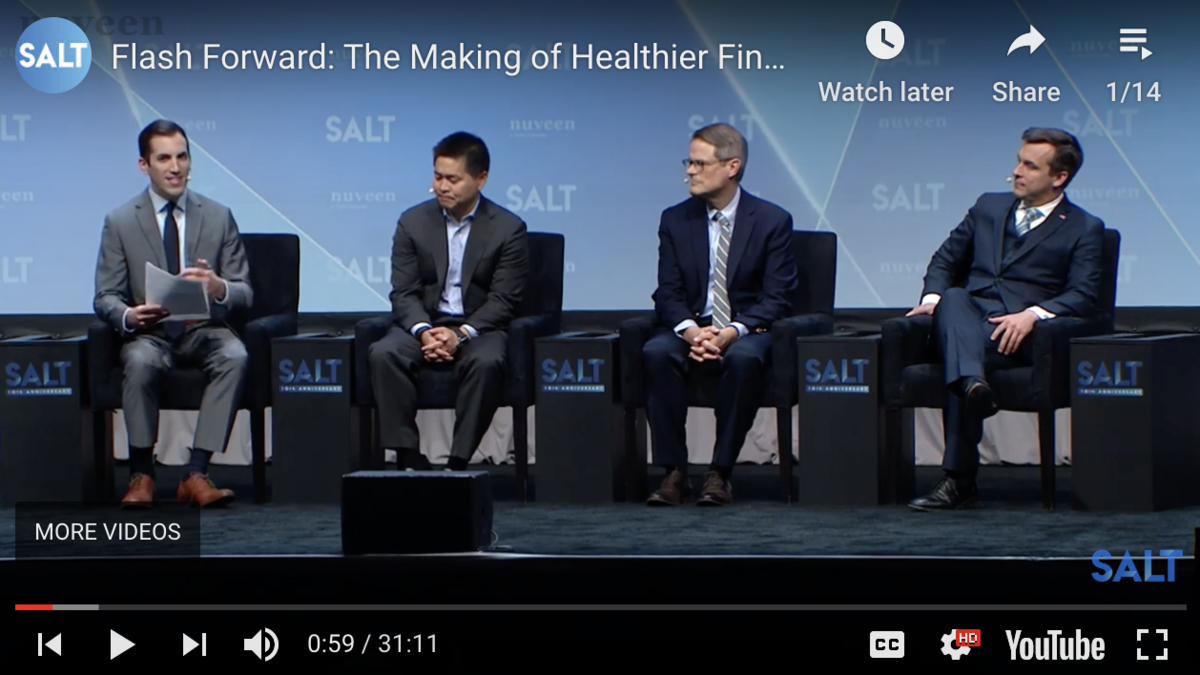You cannot publish everything Anthony Scaramucci tells you. I’ve had conversations with him several times on recent visits to the Middle East where he has offered views — for example, on the state of health of the president of the US — that would not make it into a family newspaper on grounds of taste, or legality, or both.
Fortunately, what you can publish is more than enough to make a decent interview, so it was with a sense of expectation that I started a phone call with the hedge fund manager and communications adviser to President Donald Trump, whom many call “The Mooch.” I was not disappointed.
He wanted to talk first about the forthcoming forum he is staging in the UAE capital Abu Dhabi, the SALT Conference, named after his financial business Skybridge, which he said is “one of the joys of my life.”
The event has been going since 2009, with a must-attend annual gathering in Las Vegas, Nevada as its flagship event. But this is the first time it has come to the Middle East. It was a choice between Saudi Arabia and the UAE, he said, and he went for Abu Dhabi because it is “a little more open,” he explained.
“I know Saudi Arabia is in the process of opening, but Abu Dhabi was the most collaborative of the places we considered. We’ve been able to mix our DNA with theirs to make a blended version,” he said.
Scaramucci was especially impressed with Ahmed Al-Sayegh, the executive chairman of the Abu Dhabi Global Market where the SALT event will be held. “He’s my guy. He’s the guy I want to do business with,” he said.
BIO
BORN: Long Island, NY, 1964.
EDUCATION:
- Paul D Schreiber Senior High School.
- BA in economics Tuft’s University
- Doctor of Jurisprudence, Harvard Law School.
CAREER:
- Investment banker, Goldman Sachs.
- Co-founder, Oscar Capital Management.
- Lehman Brothers.
- Founder and managing partner, Skybridge.
With the SALT plug over, we talked more about the Middle East. He has been coming to the region since 2005, when he started doing investment business for some big Saudi investors, and only Yemen remains on the list of places he has not visited. His most recent trip was to the Future Investment Initiative (FII) in Riyadh.
“I’ve never been to a conference like that before, and I’ve been to Davos and hundreds of others around the world. I was blown away by the FII, by the amount of money spent and by the range of people there. I met maybe 100 people I’d never have met anywhere else,” he said.
Before that, we had chatted at the Peace to Prosperity conference organized by Trump’s son-in-law Jared Kushner in Manama, Bahrain. “Trump hired a 38-year-old to bring peace to the Middle East, hoping he’d figure it out. I don’t think there’s going to be peace as a result,” he said dismissively.
He called the Middle East “a rough neighborhood,” but said Western media often exaggerates the problems there, especially on cable TV. “The Western media isn’t going to like me saying this, but I get along with these people in the region, they are very welcoming. And the cities are very modern. New York and London are layered over by modernity, but here they’ve done an amazing job on infrastructure. I’d trade Dubai international airport for JFK tonight,” he said.
And it’s not just physical facilities he admires. “They’re working hard on tolerance. I realize things are not perfect and we live in a rough world, but you’ve got to keep working towards modernity and racial and religious tolerance,” he said.
Our conversation came round to the late Jamal Khashoggi, who was a regular guest at Scaramucci’s annual gathering at the World Economic Forum in Davos. “It (his death) was an unmitigated disaster and tragedy. Sometime decisions and institutions are flawed, and have tragic consequences.”
But he does not think the incident should lead to a reduction of US involvement in the Middle East, as some US politicians have advocated. “At the same time, I want a better place for my children, so it’s a good thing for us to have a presence in the region,” he said.
“Obviously, mistakes were made in Saudi Arabia, but when I see what’s been going on in the Kingdom, it will be a more tolerant and open place than it was 20 years ago,” he said.
The damage caused by the Khashoggi affair will linger for some time, he believes. “It will not be solved quickly. If I was on the Kingdom’s crisis management team, I’d advise the crown prince to open up more to the press. I wrote an article in the US stating that the media was not the ‘enemy of the people,’ and the president did not like that, but leaders get too sensitive about criticism from the press.
“A free and fair press globally helps society by providing a voice to the people and makes them feel empowered. It teaches young people to think freely. A lot of economic innovation, like Facebook and Google, comes from that,” he said.
His advice to the Saudi leadership in the wake of Khashoggi is simple: “You’re winning. Ignore the criticism. The House of Saudi has enjoyed 80 years of peace and security despite some obvious problems. Having a free press would allow you to help fix those problems.”
But he is not telling the Kingdom how to organize its affairs. “I’m very respectful of other systems and cultures. The West often makes the mistake of trying to impose our systems and values on others. I’m just advising them to open it up a little bit.”
Scaramucci was at the receiving end of a “free and fair press” during his brief stint as director of communications for Trump in 2017. His ten days in the White House ended in a tirade of scurrilous comments on his enemies in the administration after a journalist published what he regarded as off-the-record remarks delivered with characteristic candidness.

Panelists are shown in this still image of a video taken during the SALT conference in Las Vegas last May. (Screengrab from YouTube video)
It was a life-changing moment for The Mooch. He had been a backer of Democrats in the past, but became a Trump supporter during the 2016 campaign. After his dismissal from the White House, and especially after some of Trump’s most vicious anti-immigrant comments, he turned gradually into one of the administration’s most vociferous opponents.
He is now actively campaigning to have Trump removed from office, and encouraging other Republicans to stand against him in next year’s election. His Twitter feed is one of the main sources of “resistance” to the Trump administration.
“Given his rank lawlessness and criminal activity, the lack of resistance in the Republican party to him tells you a lot about the hypocrisy in America today. He has clearly broken the law, but he has a group of sycophants and acolytes who won’t condemn what he’s doing.
“I just think he’s the wrong leader for the US. Our system is supposed to ensure that everyone is subject to the law. The president is supposed to serve, not rule. I think the guy is a traitor,” he said.
He thinks that Joe Biden, the former vice president in the Obama administration, has the best chance of beating Trump next year because he can flip vital states in the midwest that narrowly chose Trump in 2016. “The Trump campaign is most afraid of Biden, which is why they’re working overtime to try to dig up dirt on him,” he said.
On the Republican side, he has championed the cause of Utah Senator Mitt Romney, but he does not see any serious challenge from the Republicans. “I don’t think anyone with a real chance will step up. The people best positioned are standing aside in order to prepare themselves for the future. They hate his guts, but they’re afraid of him,” he said.
Whatever happens in the run-up to the election, Scaramucci will not be giving up his campaign against the president, despite a relative truce in the Twitter war between himself and Trump. “He has not hit back against me since August because he doesn’t want to escalate the situation, but I’m going to keep hitting him. I’m not a politician — I know how to handle myself in a streetlight.”
To illustrate his determination to fight the Trump administration, as well as his overall life philosophy, The Mooch told me his favorite slogan, taken from the great American film director and comedian Mel Brooks: “Relax. None of us are getting out of here alive.”














